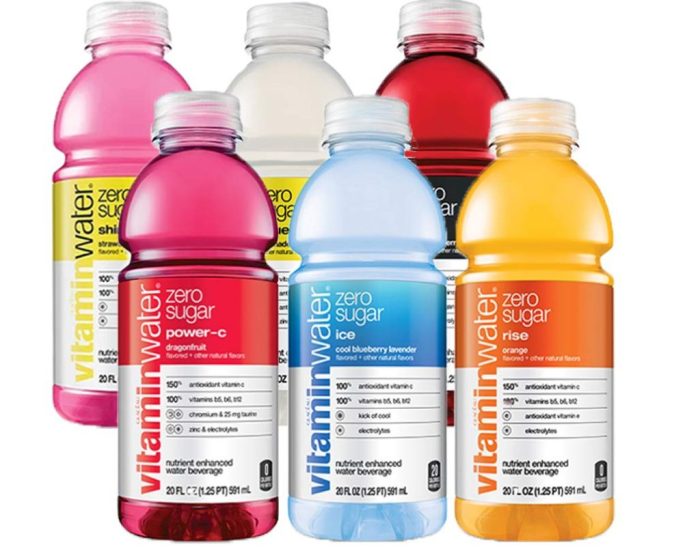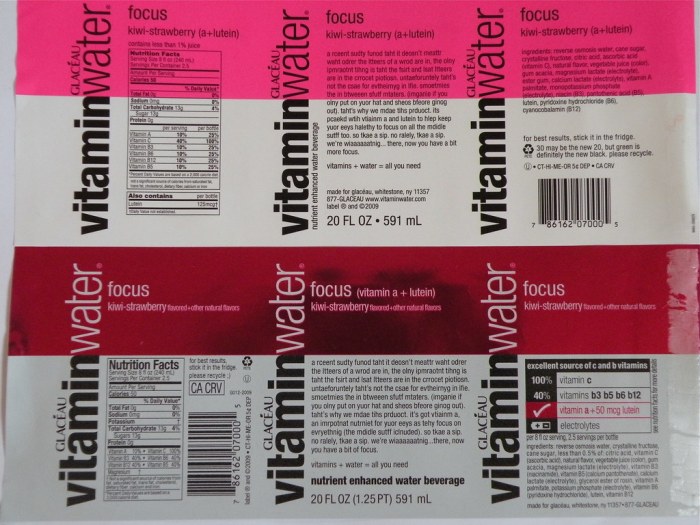Health Claims & Marketing: Vitamin Water Nutrition Facts

Vitamin water nutrition facts – Vitaminwater, and other similar enhanced water beverages, have become a significant presence in the beverage market, largely due to clever marketing strategies built around health claims. However, a critical examination of these claims reveals a complex picture, where the scientific evidence sometimes falls short of the marketing hype. Understanding the science behind these claims is crucial for making informed consumer choices.
While vitamin water boasts a healthier image, a closer look at its nutrition facts reveals a surprising amount of sugar. This starkly contrasts with the shocking reality of sugary drinks like Dr Pepper, whose nutrition facts you can find here: dr pepper nutrition facts. Understanding both helps us make informed choices about our hydration, prioritizing the subtle nuances of vitamin water’s nutritional profile over the undeniable sugar bomb of other beverages.
Common Health Claims and Scientific Evidence, Vitamin water nutrition facts
Many vitaminwater brands promote their products as a healthy alternative to sugary drinks, emphasizing the addition of vitamins and electrolytes. Let’s analyze some common claims and the scientific backing (or lack thereof).
- Claim: Improved Energy and Enhanced Performance: Many brands associate their products with increased energy and improved athletic performance. This is often linked to the presence of B vitamins, which play a role in energy metabolism.
- Evidence Supporting: B vitamins are essential for energy production. Deficiencies can lead to fatigue. Therefore, adequate intake is important.
- Evidence Against: The amount of B vitamins in vitaminwater is often relatively small compared to recommended daily intakes. The sugar content can negate any potential energy benefit, leading to an energy crash. The effect on athletic performance is not consistently supported by robust scientific studies.
- Claim: Immune System Support: Some brands highlight the inclusion of Vitamin C and other antioxidants, suggesting improved immune function.
- Evidence Supporting: Vitamin C is an antioxidant that plays a role in immune function. Studies show that adequate Vitamin C intake can help support the immune system, particularly during periods of stress or illness.
- Evidence Against: The amount of Vitamin C in a single serving of vitaminwater is often insufficient to significantly impact immune function. A balanced diet and lifestyle are far more crucial for overall immune health.
- Claim: Hydration and Electrolyte Replenishment: The “water” aspect of vitaminwater suggests improved hydration, particularly after exercise. Electrolyte additions further reinforce this claim.
- Evidence Supporting: Electrolytes are essential for fluid balance and muscle function. Replenishing electrolytes lost through sweat can be beneficial after intense physical activity.
- Evidence Against: Plain water is generally the most effective hydration source. The added sugar in vitaminwater can actually hinder hydration by drawing water out of cells. The electrolyte levels may not be sufficient for significant replenishment after strenuous exercise.
Marketing Strategies of Different Vitamin Water Brands
Different brands employ various marketing techniques to emphasize their products’ nutritional benefits. Some focus on sleek packaging and celebrity endorsements to create an image of health and vitality. Others utilize scientific-sounding language on labels, aiming to convince consumers of their product’s efficacy. Many emphasize the low-calorie or “no-sugar-added” aspect, particularly targeting health-conscious consumers. However, the overall marketing message often overshadows the limitations of the scientific evidence supporting their health claims.
For example, one brand might highlight the “natural flavors” while another might focus on a specific vitamin’s role in energy production. The use of vibrant colors and appealing imagery is a common strategy across most brands.
Comparison to Other Beverages

Let’s dive into how Vitaminwater stacks up against other popular drinks. We’ll examine its nutritional profile in comparison to sports drinks, fruit juices, and plain water, highlighting the advantages and disadvantages of each choice in different situations. Remember, the best beverage choice depends heavily on your individual needs and activity levels.
Understanding the nutritional differences between these beverages is key to making informed choices about your hydration and overall health. We’ll look at factors like sugar content, electrolyte balance, and vitamin enrichment to provide a clear picture of each option.
Nutritional Comparison of Beverages
| Beverage | Sugar Content (per serving) | Electrolytes | Vitamins | Calories |
|---|---|---|---|---|
| Vitaminwater | Variable, check specific product label (often higher than plain water, lower than juice) | Often contains some electrolytes, but levels vary by product | Contains added vitamins, amounts vary by product | Variable, check specific product label |
| Sports Drink | Moderate to high (to replenish energy and electrolytes lost during exercise) | High (sodium, potassium, etc.) to replace electrolytes lost through sweat | May contain some vitamins, but primarily focused on electrolytes and carbohydrates | Moderate to high |
| Fruit Juice | High (naturally occurring sugars) | Low | Contains some vitamins and minerals naturally | Moderate to high |
| Plain Water | None | None | None | Zero |
Note: The values in this table are general and can vary significantly depending on the specific brand and flavor of each beverage. Always check the nutrition label for accurate information.
Benefits and Drawbacks of Choosing Vitaminwater
Vitaminwater offers the convenience of added vitamins in a flavored beverage. This can be beneficial for individuals who struggle to meet their daily vitamin intake through diet alone. However, a significant drawback is the often-high sugar content in many Vitaminwater varieties. This high sugar intake can contribute to weight gain, dental problems, and other health issues if consumed excessively.
Compared to plain water, Vitaminwater lacks the calorie-free hydration benefit. Against sports drinks, it generally lacks the balanced electrolyte profile needed for intense physical activity. Compared to fruit juice, it often has fewer naturally occurring vitamins and minerals, but usually contains less sugar, depending on the specific product.
Circumstances Where Vitaminwater Might Be Suitable
Vitaminwater might be a suitable choice for individuals seeking a lightly flavored beverage with added vitamins, particularly if they are already mindful of their overall sugar intake and are not engaging in intense physical activity. For example, someone who needs a small boost of Vitamin C and enjoys a lightly sweet beverage might choose Vitaminwater over plain water or a sugary soda.
However, it is crucial to choose lower-sugar varieties and to be aware of the overall caloric intake. For individuals engaging in strenuous exercise, sports drinks are generally a better choice due to their electrolyte content. For those prioritizing pure hydration and minimal added ingredients, plain water remains the optimal choice.
Common Queries
Is vitamin water a good source of vitamins?
While vitamin water does contain added vitamins, the amounts are often relatively small compared to the recommended daily intake. It shouldn’t be relied upon as a primary source of vitamins.
Does vitamin water help with athletic performance?
It may provide some carbohydrates for energy, but it’s generally not as effective as dedicated sports drinks formulated for athletes’ needs due to the high sugar content.
Can I drink vitamin water every day?
Regular consumption of vitamin water is not recommended due to its high sugar content. Limiting intake to occasional treats is advisable to avoid excessive sugar consumption.
Are there any artificial sweeteners in vitamin water?
This varies by brand and flavor. Check the ingredient list on the specific product to confirm the presence or absence of artificial sweeteners.
Is vitamin water suitable for children?
Due to the high sugar content, it’s generally recommended to limit or avoid giving vitamin water to children. Water or unsweetened beverages are healthier choices.



